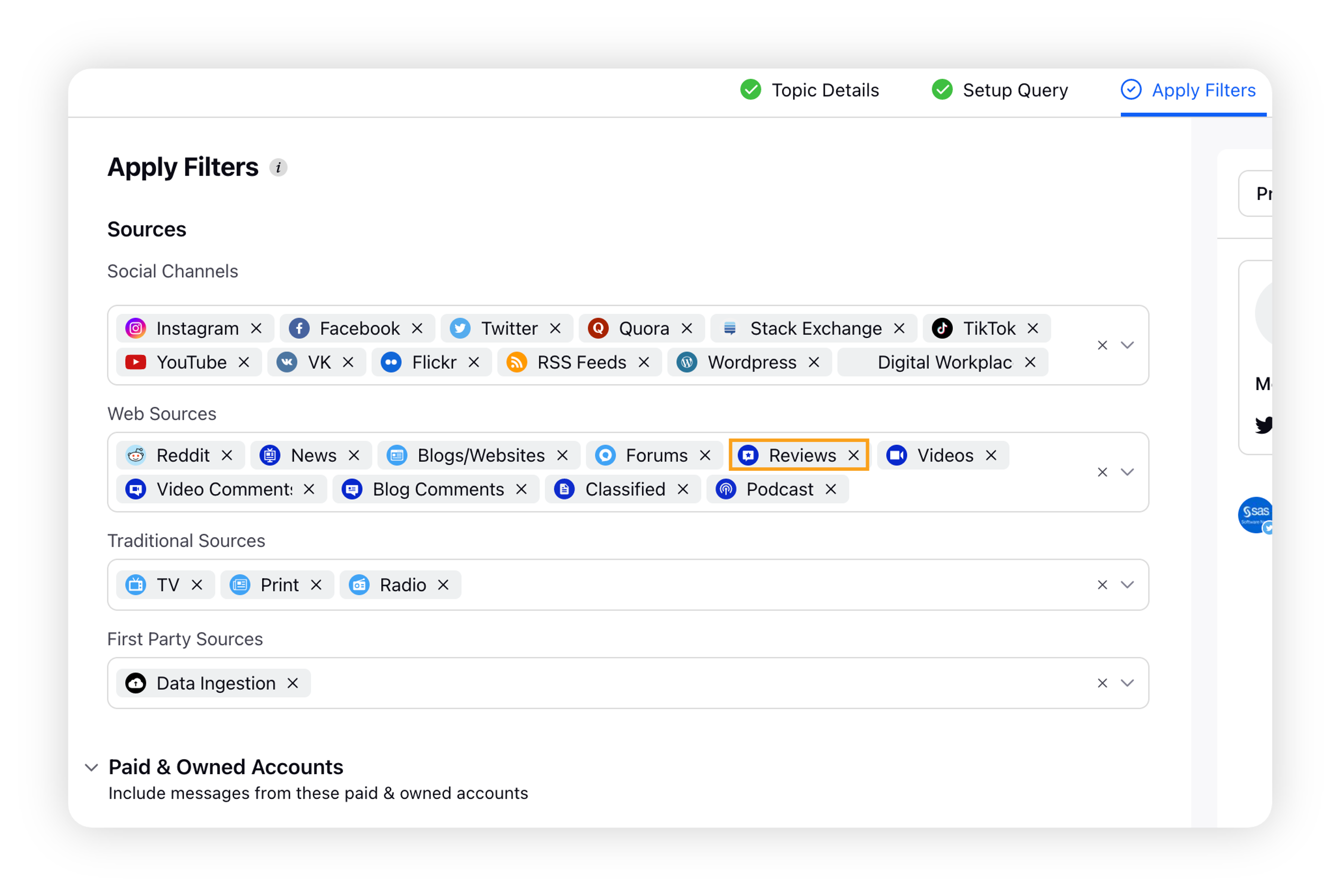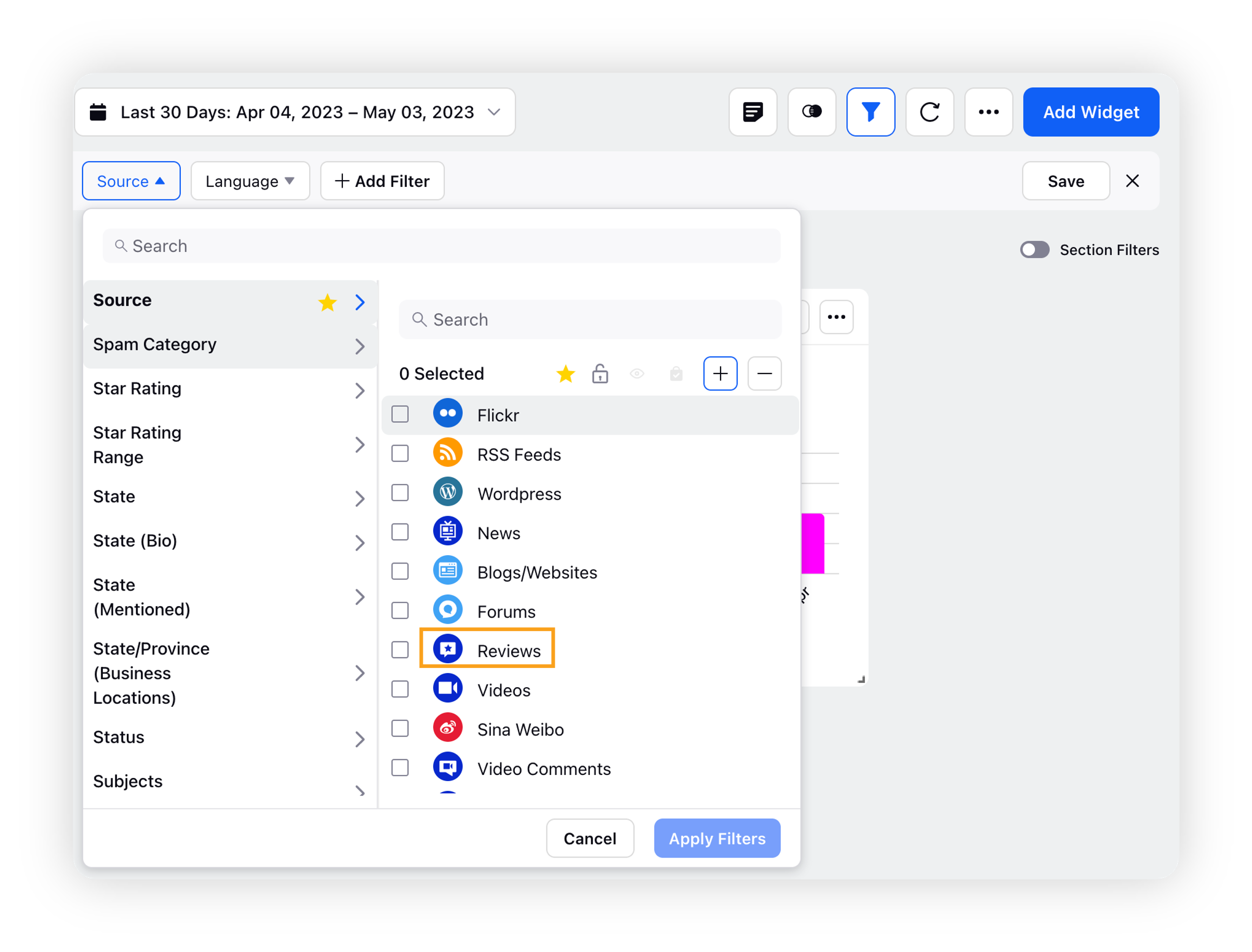Reviews as a Listening source
Updated
By adding Reviews as a Listening Source, you can listen to and learn from Reviews data.
Reviews are a massive collection of the voices of people where they make evaluations of a publication, product, service, or company or a critical take on current affairs in literature, politics, or culture. In addition to a critical evaluation, the review's author may assign the work a rating to indicate its relative merit.
We get review data from 500+ Review sources of popular review domains/e-commerce websites like App Store, Google Play Reviews, G2, Glassdoor, etc.
Reviews source capabilities
Source: Reviews
Source of data: Data vendors and Firehoses
Coverage
Earned reviews are fetched via Vendors/ Firehose from different review sites
Owned reviews are not supported
Latency: Depends on the Review sites – less than 24 hrs from time of publishing
Historical data: From the date of addition of product SKU to the review coverage
Backfill support: Yes
Engagement Stats Refresh Rate: Not updated
Author/ Profile metadata details: Yes (earned)
Author name, User bio, User image, Gender availability is dependent on the Review Source.
Note: Author URL is not consumed for reviews, hence distinct users cannot be determined accurately.
AI-enriched data: Sentiment, Emotions, Language, Word cloud, Topic Cluster, Gender (profile), Smart Themes Clustering, Smart Insights
Message type: Reviews Type (source-specific)
Media type: Photo, Review, Status, Link, Link Status, Reply, Link Text, Blog
Reviews data entities in Social Listening
Data Entities | Type | Description |
Media Reach/ Overall Reach | Metric | A measure of the size of the potential audience of a message(web) |
Domain | Dimension | The top level domain name of a message's website of origin. |
Domain Authority | Metric | Domain Authority (DA) is a search engine ranking score developed by Moz that predicts how likely a website is to rank on search engine result pages (SERPs). A Domain Authority score ranges from 1 to 100, with higher scores corresponding to a greater likelihood of ranking. |
Distinct Domains | Metric | Distinct domains count from which mentions coming in |
Moz Rank | Metric | Moz Rank of the domain of this message source. Moz Rank will be in the range of 0 to 10. |
Moz External Links | Metric | Moz External Links gives the number of external links to the domain of the source website of the message. |
Moz Spam Score | Metric | Moz Spam Score is a metric that indicates how likely a website is to be penalized by the search engines as a site that provides low value to searchers, as measured by the ratios of content to code, content to external links, external links to internal links, and several other factors. The Spam Score will be in the range of 0 to 18. Higher Spam Score implies higher spam content. |
Alexa Page Views | Metric | Pageviews are the total number of Alexa user URL requests for a site. Note that the pageviews are not unique. Note: As per the new calculation logic updates we have made in the Alexa Page View metrics, you will get the exact values sent by the Alexa team as is without any modifications.
|
Alexa Rank | Metric | A relative measure of global popularity based on unique visitor and pageviews metrics from the past 3 months. Note that Country ranks are similar but are based on metrics for a specific country from the past 1 month. |
Alexa Reach | Metric | Alexa Reach is an Alexa Web Search metric that measures the number of people who have the Alexa toolbar or extension installed and who see your content. For example, if your website has a Reach Score of 5,000, this means that 5,000 people out of a sample of 1 million, who have the toolbar or extension installed, saw your site yesterday. Alexa Reach should not be used/compared in conjunction with other metrics as the logic for calculation is totally different. Note: As per the new calculation logic updates we have made in the Alexa Reach metric, you will get the exact values sent by the Alexa team as is without any modifications.
|
Threads | Dimension | Link to the associated message thread from the web source |
Star Rating | Dimension | Review Star Rating from 0 to 5 |
Star Rating Range | Dimension | Categorisation of Star Rating from 0-5 |
To fetch data from Reviews
In order to fetch data from Reviews, you need to create a Topic with Reviews as its source.
While creating or editing your topic, click the Apply Filters tab, and select Reviews as one of the Web Sources.

You can also select Source: Reviews from the dashboard/widget filter.

To learn in detail about how to create a topic, read Create a Topic in Topic Creation UI.
To backfill data from Reviews
Once the Topic is created/ updated, you can backfill the Topic from the date of addition of the product SKU to the review coverage.
To know more about how to backfill data, check out Listening Backfill for Topics.
Review source filter in Listening dashboard
In the Listening Dashboard, you can apply the Review Source filter at the section level as well as at the widget level.

Limitations
Product/ SKU level URLs are needed to be source verified in order to listen to product reviews.
Reviews are available only after the date of addition.
Backfill is available only from the date of addition. Historical data for reviews are not available for non-source-verified product review URLs.
Crawlers typically crawl at a frequency of once a day.
Crawlers typically do not paginate and parse only the first page of the reviews at the time of each daily crawl. Therefore, certain misses in reviews are expected for source verified reviews as well.
Sites which impose crawling restrictions, or which are login/ subscription based – Review Fetching is not possible due to compliance.
Reviews from eCommerce apps are not supported. Only website reviews are supported.